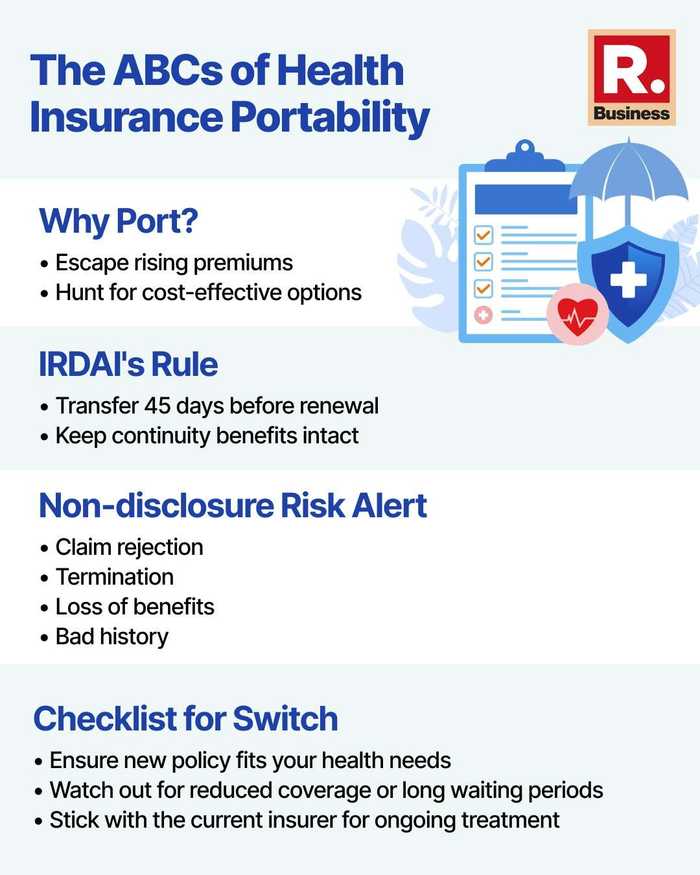Published 09:43 IST, January 16th 2024
Planing to port your health insurance policy? Avoid claim rejection with these expert tips
Irdai allows health insurance policy transfers between insurers, requiring applications at least 45 days before renewal.
- Republic Business
- 3 min read
Seamless insurance transition: Are you contemplating the prospect of porting your health insurance policy? The current surge in the trend of health insurance policy portability can be attributed to various factors, with escalating premiums being a significant driver. Many policyholders are actively seeking more affordable options, particularly when confronted with premium hikes in their existing plans.
Insurers who offer discounts have become increasingly attractive to individuals on the lookout for cost-effective alternatives or enhanced coverage. Nevertheless, experts emphasise the importance of adhering to specific guidelines when considering the porting of your health insurance policy.

Irdai's portability guidelines
The Insurance Regulatory and Development Authority of India (Irdai) permits policyholders to transfer their health insurance policies from one insurer to another, with the condition that the application is submitted at least 45 days before the renewal date. Throughout this process, continuity benefits are preserved, ensuring a seamless transition. "Despite the advantages, it is imperative to be forthright about disclosing all existing illnesses, including those diagnosed after purchasing the original policy, to avoid claim denials, said Sanjeeb Rout from National Insurance Company.
Risk of non-disclosure
He underscores the importance of full disclosure, saying that failing to reveal existing illnesses or crucial information during the porting process can have severe consequences. Non-disclosure may result in claim rejections by the new insurer, as the premium and coverage calculations were made without considering undisclosed health conditions. In extreme cases, the new insurer might even terminate the policy, deeming the non-disclosure a breach of contract, leaving the policyholder without coverage.
Furthermore, the repercussions extend to the loss of continuity benefits accrued over time with the previous insurer. If the policy is cancelled due to non-disclosure, the insured may lose these benefits, necessitating the completion of waiting periods for specific conditions when obtaining a new policy. This could potentially cause delays in coverage for existing health conditions.
Moreover, having a policy cancelled due to non-disclosure can negatively impact future insurance prospects. Insurers may view such history unfavourably, resulting in increased policy premiums. To avoid these outcomes, policyholders are urged to be transparent and disclose all relevant health information during the porting process, ensuring the legitimacy of future claims and maintaining continuity in insurance coverage.

Healthcare compatibility check
While seeking to port for reasons like premium discounts or enhanced coverage, experts say it is crucial for policyholders to confirm that the new policy aligns with their healthcare needs. Lower premiums may sometimes come with trade-offs, such as reduced coverage or extended waiting periods. "In cases where an individual has been diagnosed with an illness requiring ongoing treatment, it is advisable to remain with the current insurer to avoid complications like higher premiums or potential denial of coverage for that specific condition by the new insurer, Rout said.
Updated 13:24 IST, January 17th 2024